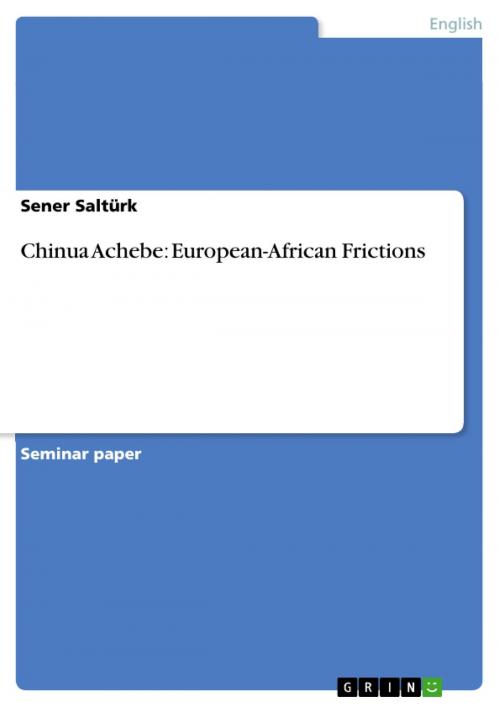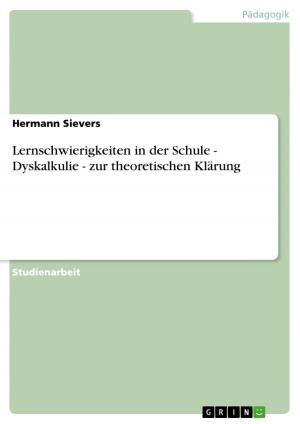Chinua Achebe: European-African Frictions
Fiction & Literature, Literary Theory & Criticism, British| Author: | Sener Saltürk | ISBN: | 9783656303008 |
| Publisher: | GRIN Verlag | Publication: | November 6, 2012 |
| Imprint: | GRIN Verlag | Language: | English |
| Author: | Sener Saltürk |
| ISBN: | 9783656303008 |
| Publisher: | GRIN Verlag |
| Publication: | November 6, 2012 |
| Imprint: | GRIN Verlag |
| Language: | English |
Seminar paper from the year 2005 in the subject English Language and Literature Studies - Literature, grade: 1,0, University of Duisburg-Essen, language: English, abstract: [...] Although there is quite a number of reasonable arguments for not welcoming Turkey to the European 'family', such as financial as well as political and ethical, the majority of Turkish people consider prejudices against Turks as the actual reason for their rejection: they are (culturally) too different and more than the half of the European citizens are against a Turkish membership in the EU. Instead, a 'privileged partnership' is being proposed by some conservative European governments (or opposing parties such as the German Christian Democratic party), instead of a full membership. I think 'full' needs to be emphasised here because it means a real and well-meant friendship, a step closer to becoming a family member one day rather than a mere political (or strategical) ally. Well, family implies that there are less differences, that one is almost alike. There are many European tenets as well as traditional views which hinder an honest dialogue since Europe has yet to rid itself of some of its dangerous ideas ('maleficent' fictions) which set the world ablaze in the 20th century. Neither Nigeria is honestly acknowledged, nor is (in the minds of many a European critic) Achebe's writing universal5, nor is Turkey's fourty-year old endeavour to become a full European member acceptable. There is, intellectually, a problem on the part of Europe to accept the idea of equality which Achebe has been persistently trying to point out both in his novels and in his essays (which is the same reason, I think, why Turkey is so hard done by): feeling of superiority. That is why Achebe's books lack the quality of universal European (or Western) books and is only applicable to Nigeria and likewise the reason for Turkey being a second-rate country. Both of these concepts reveal classical European ideas that will - in all probability - prove to be false during the course of the twenty-first century. In order to support my thesis, which I admit sounds far-fetched at first glance, I will refer to Chinua Achebe's accounts on colonial criticism and, wherever possible, compare them to the recent issue in European dealings with the Other, i.e. the Turk. I will later on focus on the novels 'Arrow of God' and 'A Man of the People', particularly on the aspect of religion in 'Arrow of God' and the post-colonial phenomena of Nigeria in 'A Man of the People'.
Seminar paper from the year 2005 in the subject English Language and Literature Studies - Literature, grade: 1,0, University of Duisburg-Essen, language: English, abstract: [...] Although there is quite a number of reasonable arguments for not welcoming Turkey to the European 'family', such as financial as well as political and ethical, the majority of Turkish people consider prejudices against Turks as the actual reason for their rejection: they are (culturally) too different and more than the half of the European citizens are against a Turkish membership in the EU. Instead, a 'privileged partnership' is being proposed by some conservative European governments (or opposing parties such as the German Christian Democratic party), instead of a full membership. I think 'full' needs to be emphasised here because it means a real and well-meant friendship, a step closer to becoming a family member one day rather than a mere political (or strategical) ally. Well, family implies that there are less differences, that one is almost alike. There are many European tenets as well as traditional views which hinder an honest dialogue since Europe has yet to rid itself of some of its dangerous ideas ('maleficent' fictions) which set the world ablaze in the 20th century. Neither Nigeria is honestly acknowledged, nor is (in the minds of many a European critic) Achebe's writing universal5, nor is Turkey's fourty-year old endeavour to become a full European member acceptable. There is, intellectually, a problem on the part of Europe to accept the idea of equality which Achebe has been persistently trying to point out both in his novels and in his essays (which is the same reason, I think, why Turkey is so hard done by): feeling of superiority. That is why Achebe's books lack the quality of universal European (or Western) books and is only applicable to Nigeria and likewise the reason for Turkey being a second-rate country. Both of these concepts reveal classical European ideas that will - in all probability - prove to be false during the course of the twenty-first century. In order to support my thesis, which I admit sounds far-fetched at first glance, I will refer to Chinua Achebe's accounts on colonial criticism and, wherever possible, compare them to the recent issue in European dealings with the Other, i.e. the Turk. I will later on focus on the novels 'Arrow of God' and 'A Man of the People', particularly on the aspect of religion in 'Arrow of God' and the post-colonial phenomena of Nigeria in 'A Man of the People'.















